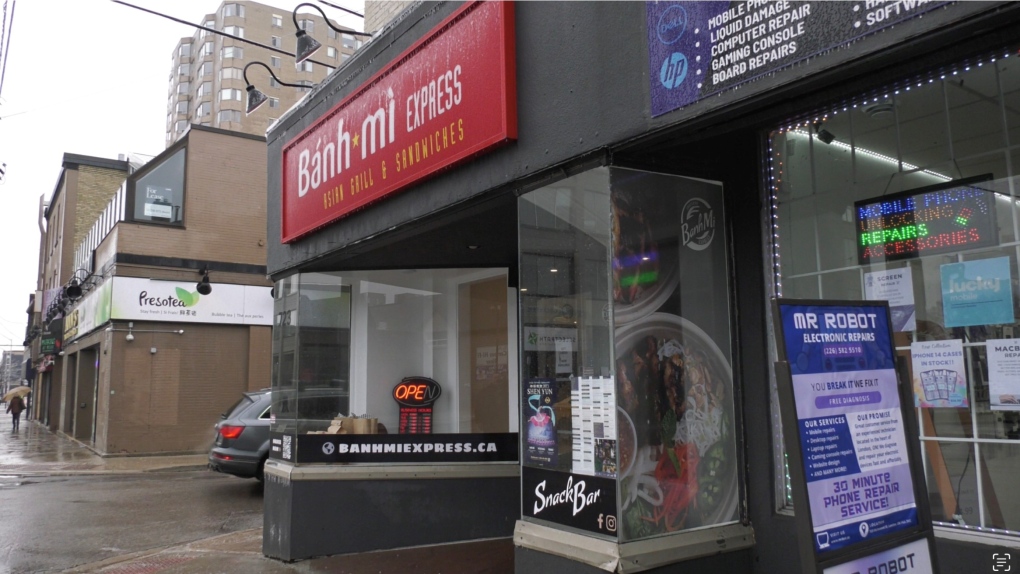Businesses prepare for the rollout of the province’s new naloxone program
Ontario businesses considered to be a "high-risk" setting will soon be required to have a naloxone kit on site but some feel the province could go further in the effort to prevent opioid deaths.
Labour Minister and Lambton Kent Middlesex MPP Monte McNaughton says the goal is to identify workplaces where drugs may be used and make sure naloxone kits are available to counteract the effects of an overdose.
"These businesses will be required to have life-saving naloxone kits and trained workers in the workplace,” McNaughton said.
Free naloxone kits and training will be available to high-risk small businesses for two years.
"Time is really of the essence when we're talking about these situations,” says Western University professor Steven Laviolette. His research delves into a number of aspects linked drug use, including impacts on brain function.
He sees a benefit to the targeted rollout of the naloxone kits.
"I think that a targeted approach makes the most sense, given limited resources and challenges with having enough staff on hand to act appropriately with the appropriate training,” Laviolette said.
The program is mandatory for businesses that have identified someone struggling with addictions and at risk of overdose. Bars and construction sites were cited as examples.
However, other small businesses say the also deal with addictions on an ongoing basis.
 Staff and management at Bahn Mi Express, an eatery along London's Richmond Row, say they often deal with individuals overdosing outside the restaurant and would welcome training for the use of naloxone kits pictured in London, Ont. on Thursday, Dec. 15, 2022. (Gerry Dewan/CTV News London)Staff and management at Bahn Mi Express say, since opening their Richmond Row eatery opened this time last year, they've seen a growing number of overdose emergencies at the their door step.
Staff and management at Bahn Mi Express, an eatery along London's Richmond Row, say they often deal with individuals overdosing outside the restaurant and would welcome training for the use of naloxone kits pictured in London, Ont. on Thursday, Dec. 15, 2022. (Gerry Dewan/CTV News London)Staff and management at Bahn Mi Express say, since opening their Richmond Row eatery opened this time last year, they've seen a growing number of overdose emergencies at the their door step.
"In the front, because it's covered, and in the back of the restaurant,” says spokesperson Shauna Versloot. “They've had to call EMS (emergency medical services) several times."
Versloot says management and staff want to be able to help those individuals.
“With a little bit of education and showing them how to work the kit, they all seemed very enthusiastic about helping others,” she said.
"I think it's a good thing, overall, to normalize that we intervene to protect people's lives,” says professor Jacob Shelley.
He is a member of Western University’s Faculty of Law, specializing in medical ethics and the law where it pertains to public health matters. He says the law generally falls on the side of those intervening during a medical emergency.
"As a general rule in Ontario we have the Good Samaritan Act which is legislation that protects people who intervene to act to help others. Unless somebody is grossly negligent they'd be protected from liability,” Shelley said.
Shelley points to the use of defibrillators, now common in public spaces, and administering EPI pens, for those experiencing allergic reactions, as examples where some would intervene to give medical assistance. He feels the naloxone policy could open a broader discussion about ways members of the public can act to assist others.
The government’s naloxone program goes into effect in June of next year.
CTVNews.ca Top Stories

Canadian team told Trump's tariffs unavoidable right now, but solutions on the table in surprise Mar-a-Lago meeting
During a surprise dinner at Mar-a-Lago, representatives of the federal government were told U.S. tariffs from the incoming Donald Trump administration cannot be avoided in the immediate term, two government sources tell CTV News.
Muskoka reacts to major snowfall, hundreds stuck on Highway 11
From road closures, power outages, weather declarations and nonstop shovelling, Muskoka residents were faced with nearly a metre of persistent snowfall on Saturday.
Saskatoon priest accused of sexual assault says he meant to encourage young girl with hug and kiss
A Saskatoon priest accused of sexual assault says he meant to encourage and reassure a young girl when he hugged and kissed during his testimony at Saskatoon Provincial Court Friday.
Toronto man accused of posing as surgeon, giving four women injections
A 29-year-old Toronto man has been charged after allegedly posing as a surgeon and providing cosmetic procedures on several women.
Bob Bryar, drummer for rock band My Chemical Romance, dead at 44
Bob Bryar, former drummer for the band My Chemical Romance, has died. He was reportedly 44.
Pedestrian killed by Via Rail train near Kingston, Ont.
Regular rail traffic has resumed with severe delays.
Trump threatens 100% tariff on the BRIC bloc of nations if they act to undermine U.S. dollar
U.S. president-elect Donald Trump on Saturday threatened 100 per cent tariffs against a bloc of nine nations if they act to undermine the U.S. dollar.
'Disappointing': Toronto speed camera cut down less than 24 hours after being reinstalled
A Toronto speed camera notorious for issuing tens of thousands of tickets to drivers has been cut down again less than 24 hours after it was reinstalled.
W5 Investigates 'I never took part in beheadings': Canadian ISIS sniper has warning about future of terror group
An admitted Canadian ISIS sniper held in one of northeast Syria’s highest-security prisons has issued a stark warning about the potential resurgence of the terror group.
































